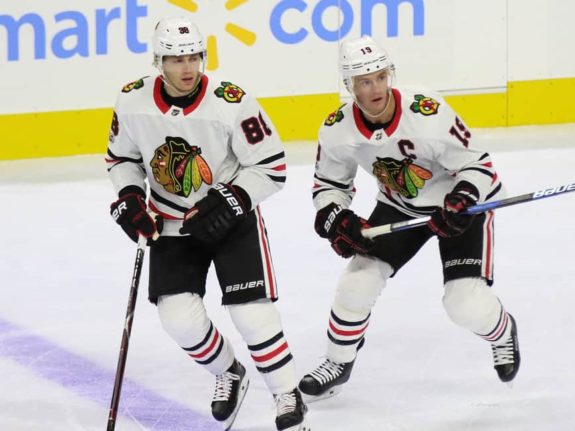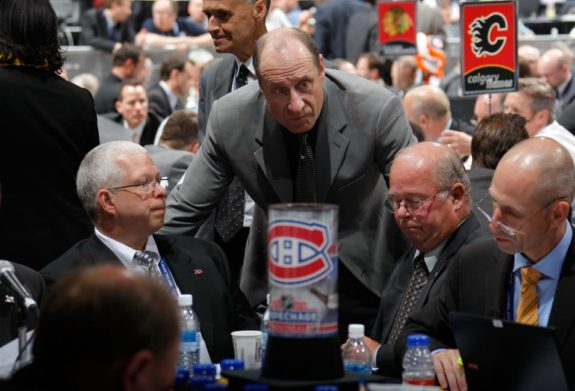June 19 has seen the crowning of two Stanley Cup champions over the years and a third memorable Stanley Cup Final game that ended with some overtime magic. Off the ice, there were a handful of coaching moves, and a new class was added to the Hockey Hall of Fame. The THW time machine is warmed up and ready to take back through the years to relive all the best moments this date has had to offer.
Stars Finally Win It All
It took three nearly three overtimes, and a skate may or may not have been in the crease, but the Dallas Stars won its first and only Stanley Cup on June 19, 1999. Brett Hull scored at 14:51 of the third overtime to give the Stars a 2-1 victory over the Buffalo Sabres in Game 6 of the Stanley Cup Final.
Jere Lehtinen gave the Stars a 1-0 lead, eight minutes into the first period, with his 10th goal of the playoffs. Stu Barnes evened up the score late in the second period, and it remained tied for the next 56:30 of play. Hull’s skate was clearly in the crease when he put the puck in behind Dominik Hasek, but the goal stood because he was ruled to be in possession of the puck.
The Conn Smythe Trophy, given out to the most valuable player of the entire postseason, was won by Joe Nieuwendyk. The veteran center led the team with 11 goals and was second behind Mike Modano in overall team scoring with 21 points.
Canes Raise the Cup
On June 19, 2006, the Carolina Hurricanes beat the Edmonton Oilers 3-1 in Game 7 of the Stanley Cup Final to win the first NHL championship in franchise history. The team, known as the New England Whalers at the time, won the World Hockey Association (WHA) championship in 1973.
Aaron Ward opened the scoring with a goal for the Hurricanes just 1:26 into the game. Frantisek Kaberle’s second-period power-play goal proved the be the game-winner. Fernando Pisani made things interesting by cutting the lead in half just 63 seconds into the final period. “Mr. Game 7,” Justin Williams, iced the game and the series with an empty-net goal in the final seconds.
Hurricanes’ captain and current head coach, Rod Brind’Amour, received the Stanley Cup from commissioner Gary Bettman after playing in 1,187 regular-season games without a championship. The Conn Smythe Trophy went to first-year goaltender Cam Ward, who went 15-8 with a 2.14 goals-against average (GAA) and a .920 save percentage (SV%) during the playoffs. He was just the fourth rookie ever to take home the award.
Blackhawks Even the Series
The Chicago Blackhawks beat the Boston Bruins 6-5 in overtime on June 19, 2013, in Game 4 of the Stanley Cup Final. The victory evened the series a 2-2 as it shifted back to the Windy City for Game 5.
Michal Handzus’ shorthanded goal opened the scoring in the first period, and Rich Peverley evened things up for the Bruins about eight minutes later.
Things got crazy in the middle frame as the two teams combined for five goals. Jonathan Toews and Patrick Kane scored about two minutes apart to give the Blackhawks a 3-1 lead.

Milan Lucic got one of those goals back, but Marcus Kruger answered 49 seconds later. Patrice Bergeron’s power-play goal cut the deficit down to 4-3 before the second intermission.
Bergeron’s second goal of the night tied the game just two minutes into the third period. Patrick Sharp put the Blackhawks back on top with a power-play tally, but Johnny Boychuk answered less than a minute later to force overtime. Blackhawks defenseman Brent Seabrook scored his second overtime goal of the 2013 postseason, at 9:51 of the extra time, to lead his team to victory.
After a total of 12 goals were scored during the first three games of the series, the fourth game saw the offenses explode for 11 combined goals. All five of the Bruins’ goals were scored on Blackhawks’ goaltender Corey Crawford’s glove side, making the pundits believe the team had exposed a weakness. He allowed just three goals in the final two games of the series.
Odds & Ends
New York Rangers general manager Craig Patrick stepped down as head coach on June 19, 1985, and named Ted Sator as his successor. Sator took the Rangers to the Wales Conference Final in his first season behind the bench, but he was fired 23 games into the 1986-87 season by new general manager Phil Esposito.
On June 19, 1990, the Minnesota North Stars named Bob Gainey as their new head coach, replacing Pierre Page. Gainey led the North Stars to the Stanley Cup Final in his first season, where they lost to the Pittsburgh Penguins. He stayed with the franchise when they relocated to Dallas. He was let go midway through the 1995-96 season and replaced by Ken Hitchcock, who coached the team that won the Stanley Cup on this date in 1999.

Darryl Sutter stepped down as coach of the Blackhawks on June 19, 1995, after three seasons behind the bench. He had a record of 110-86-26 in Chicago and was eventually replaced by Craig Hartsburg. Sutter got his second NHL head coaching job when he was hired by the San Jose Sharks prior to the 1997-98 season.
The Minnesota Wild named Jacques Lemaire as their first head coach in franchise history on June 19, 2000. The announcement came four months before the start of the team’s first NHL season. Lemaire coached the Wild for their first eight seasons, going 293-255-108 with three Stanley Cup playoff berths.
On June 19, 2002, the Hockey Hall of Fame announced its newest members. St, Louis Blues’ all-time leading scorer Bernie Federko, four-time Stanley Cup winner with the New York Islanders Clark Gillies, Montreal Canadiens’ defenseman Rod Langway and head coach Roger Neilson were all voted into the Hall.
After extending his goal-scoring streak to seven games in Game 4 of the Eastern Conference Final on June 19, 2021, Brayden Point tied the second-longest goal streak in one postseason. The most is still Reggie Leach, who scored in 10 straight with the Flyers in 1976.
Happy Birthday to You
A total of 17 current and former NHL players were born on June 19. The most notable names of the group include Walt McKechnie (77), Jim Corsi (70), Sergei Makarov (66), Dan Ellis (44), Alex Frolov (42), Jonny Brodzinski (31), and Joey Anderson (26).
*Originally constructed by Greg Boysen
Sign up for our NHL History Substack newsletter
